Ghost Trapper 13 The Trailwalker Read online
Page 11
“And you came here as a kid yourself, right?” I asked.
“Well, uh, yeah.” He stumbled over his words before recovering. “That's why I know what a special place this is. I wanted to bring back all of that old magic for today's kids. My own kids most of all.”
“And has it?” I asked.
“Has it what?”
“Brought back the magic for your family?”
He scowled and dropped out of character, his tone clearly annoyed. “What kind of question is that?”
“Oh, sorry,” I said, feigning more remorse than I felt. “I thought it was kind of a softball question.”
“Right.” He rubbed his head. “Sorry. Can we cut it?”
“Of course,” Stacey said, beaming at him to try to cheer him up.
“My family has... enjoyed the challenge of... let's skip ahead to something else.” He seemed rattled, less focused now. “What should we talk about next? Our programs and activities? A day in the life of a Stony Owl camper? We can start at the ropes course, that was always my favorite.”
“Why did it close?” I asked.
“Sorry?”
“Why did the camp close last time? You said it was the Great Depression the first time.”
“Right.” He stared at the camera like a deer who'd wandered into a whole stadium full of bright lights. “Can we stop for a second?”
“Of course.” Stacey paused the recording.
“We really don't need to get into all that depressing stuff,” Josh said.
“What do you mean?” I asked, doing my level best to sound innocent of any knowledge about drowned kids.
“The reason it closed before.” He licked his lips and shook his head. “It wasn't the camp's fault. They brought it on themselves.”
“Who did?” That was me, trying even harder to sound unaware.
“The guys. Paul and Thomas. And Kyle. They snuck out at night when the weather was bad. They didn't even use vests.” He shook his head. “It wasn't fair to close the camp over it. They broke the rules. All of them, maybe.”
“And that led to the camp closing?”
“Of course.” He looked at me like I was crazy. “Three campers died. Never mind whose fault it was, or how they risked their lives just to...” He shook his head.
“To what?”
“To see how tough they were, I guess.” Josh looked away. “Anyway, the camp shouldn't have been closed, that's how I felt. Not permanently. Obviously, we'll implement stricter, more modern safety precautions. But at some point people are responsible for their own choices. You can't help it if other people insist on doing something dangerous. Right?”
“Of course,” I said, thinking that he was desperately seeking some validation on that. “Did you know the boys who drowned?”
“We were here at the same time. We don't need to talk about this for the website.”
“It's not for the website.”
“Of course.” He finally looked me in the eyes again. “Are you going to say they're haunting the campground?”
“Well—”
“Because that is really, and I don't say this lightly, in very poor taste. It's one thing to tell legends of ancient spirits walking the trails. The Trailwalker legend, that's a part of this place, and it's a fun campfire story. But those boys were real. They had families. And friends. You can hurt people like this.”
“We're not trying to hurt anyone,” I said. “We recorded more activity last night. We don't know what's causing it, but the more we learn about the history of the place, the sooner we can identify and resolve the problems—”
“The only problem here is that my family doesn't want to adapt to changes,” he said. “My kids are screen zombies. My wife likes a high level of creature comforts. Calling this campground haunted is just Allison's latest reason for not liking it.”
“Haunted?” The new voice was Ephraim, looking at us through a window by the lodge's front door. The window was open, and he'd heard us through the screen. He walked in through the front door, his ragged clothes dotted with white paint. “Mom thinks the campground's haunted?”
Josh jumped, at a loss for words, and gave Stacey and me an imploring look.
We held our tongues, doing our best not to step into the middle of any family problems.
“She doesn't really think it's haunted, champ,” Josh said. “We're just trying to set her mind at ease.”
“So what did you record?” Ephraim asked me. “Last night?”
Now I was at a loss for words. “Well...ah...you see...”
“Because I've kinda seen some weird stuff, too,” Ephraim said. “Like in our house. One time I saw this guy walking, only not a guy, because it's too tall. And branches at the top, like a tree, only it's really just a shadow, and I think I saw it this other time in the woods behind our house, on that deer path from Stony Owl Hill—”
“Enough!” Josh said. “Fine. Let's see what you have.”
“Our recordings?” I asked.
“Yep.” Josh sank down on a patched old sofa. “Convince me. Let's see what we're paying for.”
I hesitated, not sure if we should risk scaring Ephraim. But if he'd already been seeing things, maybe we could reassure him he wasn't alone with the problem.
Stacey raised her eyebrows at me in a questioning way.
“Go ahead,” I told her.
Soon the two of them stared at Stacey's laptop on the scratched thrift-store coffee table. She showed them the beds sliding briefly across the floor, knocking over the camera. Ephraim's mouth dropped open. Josh shook his head.
“Someone could have moved those from off camera,” Josh said.
“But we didn't,” I told him. “We weren't even in that cabin when this happened.”
“So why did you record some empty cabin in the middle of the night, anyway?” Ephraim asked.
I looked at Josh, letting him decide on the answer.
“These ladies kind of specialize in looking for, uh, well.” Josh made a meaningless gesture with one hand while avoiding eye contact with his son.
“Things that go bump in the night,” Stacey said.
“Oh. Seriously?” Ephraim's face showed confusion, then dawning interest, looking at me in a new way. “You're paranormal investigators?”
“We are,” I said.
“And Mom hired them?” Ephraim looked at Josh, who nodded. “Wow. I thought I was the only one. This place really is all freaked up, isn't it?”
“Watch your language,” Josh said.
“I did, though.”
“The microphone picked this up at the same time.” Stacey replayed the moving-bed clip with the screech of laughter added.
Josh flinched as if someone had punched him.
“That's crazy,” Ephraim said, shuddering.
“What have you experienced here, Ephraim?” I asked.
“Just like I said.” He glanced uncomfortably at his father. “That tall shape.”
“You said something like a tree.”
“Yeah. Taller than a person, branches all over the top.” He glanced at his father again. “I'm not making it up.”
Josh looked from Ephraim to us. “You're sure nobody was in the cabin when these beds moved?”
“I am certain that neither of us was in there,” I said. “I suppose, technically, we can't say that someone didn't hypothetically sneak in there and knock things around. We do have footage from outside the cabin, though, so we can check that for signs of anyone coming or going.”
“But you haven't yet?” Josh asked. “So it could still be a prank.”
“There is weird stuff happening around here, Dad,” Ephraim said.
Josh said nothing, staring at the screen.
“Does Nate know?” Ephraim asked, jarring Josh into movement again.
“No,” Josh said, but he looked befuddled, and his response sounded almost reflexive. “Does Nate know what?”
“That the camp is haunted,” Ephraim said. “And they're
investigating.”
“There's no need to tell Nate,” Josh said. “You kids will blow things out of proportion. Listen, I know this place is old, and maybe strange things happen sometimes. There is still nothing to worry about. Your mom and I are watching out for you.”
“Okay.” Ephraim cast a doubtful look at Stacey and me, his two alleged guardians from supernatural evil. “If you say so.”
“If there's anything here, we will do our best to get rid of it,” I said. “I promise you that. Both of you.”
The doubt didn't leave Ephraim's face, but Josh's hardened a bit, maybe a glimmer of resentment there. He put a hand on his pale, gangly son's shoulder and steered him toward the door. “We still have a long list for today,” he said. As they walked out, Josh looked back at us. “I think we're done here,” he added in a frosty tone before they left.
Stacey and I looked at each other but kept quiet, remembering how Ephraim had overheard us through the window. Their footsteps clomped away down the front porch steps, much like those Allison had heard while working alone at night.
Chapter Seventeen
“Could have gone better,” Stacey said. “What's next?”
“Research,” I said. “We need to know more about the camp than Josh is willing to tell us.”
“You think he's holding out on us, details-wise?” Stacey asked.
“I think it's getting a little personal for him. It was one thing to let us hunt ghosts around his camp, another to talk about people he knew in life, people who died. We may be on the road to getting fired now. But in case we are, we can at least leave Allison with more information than we've dug up so far.”
“As long as 'digging up' doesn't refer to an activity we'll be doing up at the old burial mound under a full moon.”
“Never fear. You want property records again?”
“Ugh.” She rubbed her head. “I want stronger coffee if we're going to do that. Like a fire hose of the midnight black stuff.”
“That can be arranged.”
We clambered into the van and drove up the old road to the wooden palisade gate.
“Looks like you're the gatekeeper,” I told Stacey. “Since I'm the van driver.”
She sighed and dropped out of the van, then lifted away the heavy board latch and swung the gate open. After I drove through, she closed it and climbed back in.
“It seems brighter outside the camp, doesn't it?” Stacey asked as we pulled onto the somewhat more civilized blacktop clinging to the mountainside. Nervous sweat rose from my palms, making the steering wheel slippery. Camp Stony Owl was much too high for my taste.
“It's great,” I said through gritted teeth, trying to keep my eyes on the road instead of wandering over to the death drop beyond the edge of the road.
It was a half-hour drive to Blairsville, population seven hundred-ish. It was the county's seat and largest town, the place to find the library, government, local newspaper, and even the historical society, all pretty much in walking distance of each other. Convenient. The town offered plenty of restaurants and boutique shops for all the tourists escaping the cities for the mountains.
“We should eat first.” Stacey poked at her stomach. “I'm getting pretty growly. Old Josh didn't cook us any waffles this morning. We're obviously on his bad side.”
“Research first,” I said. “We've only got a few hours before things close down.”
“Just don't send me to the property records room at the town hall,” Stacey pleaded. “I've done nothing to deserve it.”
“We can focus on the library today,” I said, having mercy on her.
The library turned out to be a charming little brick building across the street from a grassy knoll of a churchyard full of gravestones. We quickly found our way to the reference section. We discovered the town paper, the North Georgia News, had been in print since 1909, but I wanted to look back into the history of the amateur archaeologist Charles Tennyford, who'd excavated the owl years before that.
“Do you want to look at the 1920s in the North Georgia News or at the 1890s in the North Georgia Citizen of Dalton?” I asked Stacey.
“The 1920s, I guess,” she said. “I can read about flappers and Al Capone.”
Soon we summoned up, via microfilm, pale articles from the gloomy past.
I started in 1896. The Citizen had indeed found the clearing and excavation of the “ancient Indian ritual site” to be of interest:
The existence of the old mound having long been known to local farmers, great surprise ensued when Tennyford uncovered the site's true shape, a horned and winged figure he christened 'Great Stony Owl.'
“They may have worshiped the owl as a god, as the ancient Greeks revered the owl as the herald of their goddess Athena,” said Tennyford. “I believe we may have discovered an ancient idol, hinting at a lost civilization that somehow fell to savagery, like Rome itself. An ancient stone city may have stood here once, perhaps ruling the lands all around. I firmly believe we shall uncover many marvelous ruins on this site, which shall change the course of our understanding regarding the lost history of the American continent.”
“Big talk for one excavation,” I mumbled.
“Hey, I found some articles about the camp being built in 1920,” Stacey told me. “That preacher guy and his wife who founded the camp, the Carmodys, moved here from Edenton, North Carolina. He had a church, and his wife Laurie Ann played organ and led the choir. They moved here and created this camp, using some ideas from his Army training. For camp counselors, they hired students from North Georgia Agricultural College over in Dahlonega, which was co-ed.”
“Good work,” I said.
“Anything happening over there?” Stacey asked.
“Just reading about Tennyford's over-the-top claims that he'd basically found the lost city of Atlantis up on that hill. I can't tell if he was overly imaginative or trying to drum up attention. Maybe he wanted money for future excavations.”
I read onward. A total of three articles had been printed about the excavation, the last one listing some of the artifacts Tennyford had found, which I'd already seen in the museum area.
“Further efforts have confirmed my earlier predictions,” Tennyford said. “I have always said I believed the Great Stony Owl to be the grave marker of some prominent personage of ancient times, perhaps some pre-Colombian emperor of the Appalachians. Most logically this person was like an Egyptian pharaoh, believed to be a god, worshiped by his people. This headdress of antlers and beads makes as much clear. In addition, he was buried with items of silver and obsidian, which must have been of great value, perhaps sacred and holy.”
“This guy made a lot of assumptions,” I said. “I wonder if someone a little more fact-based and a little less snake-oily ever studied this site.”
A little later, as I was shuffling ahead in search of more articles about Tennyford and Stony Owl, Stacey reached out and grabbed my arm. She was pointing at her glowing screen, mouth working mutely. Then, finally: “Look. July 15, 1929.”
I read the front-page headline and felt a chill pass through me.
Camp Counselor Drowned at Stony Owl
A black and white image showed a striking young woman with a big smile, her hair in two thick blond braids under the camp's standard campaign hat.
“Another drowning?” I asked.
“Apparently went out in a canoe alone one night during bad weather and drowned in the lake.” Stacey gaped, then gestured toward me as if inviting me to share in her gape. “Just like those boys.”
“Except she was alone,” I said.
“Or was she?” Stacey asked. “What's the real story? Am I right?”
We read over the article. Gwendolyn Malloy of Valdosta, Georgia—several hours south of us, almost to Florida—had been a highly rated student at North Georgia Agricultural College, particularly in the areas of Latin, history, and philosophy. Teachers described a studious and intense girl. The other counselors at the camp, fellow students, described her
as serious and hardworking.
If anyone had a motive to kill Gwendolyn, it wasn't apparent in the news article, which was solidly behind the “tragic accident” interpretation of events. She'd been engaged to marry a fellow college student and counselor named Terrance Baker, who was described as grief-stricken. A cop would look at the spouse or significant other first when seeking a murder suspect; my mentor Calvin Eckhart, a former homicide detective turned private paranormal investigator, had taught me that.
Following Gwendolyn's death, the camp had closed for the season. When Stacey looked ahead a year, she didn't find any news of it reopening the following summer. The country had been in throes of the Great Depression by then, so combined with the camp's tragedy of the previous year, it had simply stayed closed, it seemed.
While Stacey was rummaging and sifting her way toward the conclusion that Gwendolyn's drowning had closed down the camp's first incarnation, I was looking through my own old newspapers for word of Tennyford, the bearded amateur archaeologist whose pictures reminded me of that eccentric billionaire who created Jurassic Park.
He showed up again in an October edition of the paper, claiming to have invented a new “apple-growing formula” that had supposedly resulted in a bumper crop at his own orchards. A picture showed Tennyford smiling through his cottony beard, pointing to a brown jug labeled Tennyford's Apple-Grow.
By early spring, he was dead.
Naturalist Slain by Mountain Lion
“Yikes,” Stacey said, when I pointed it out to her.
“Apparently he came back in early March of 1898 to plan another, larger excavation of the mound,” I told her. “Alone. After he'd been missing for several days, a search party formed. They found him in the first place they looked.”
“At the owl,” Stacey said.
I nodded. “What was left of him. I guess it was back in the Red Fern days when they still had mountain lions.”
“So, just to be clear,” Stacey said, “The guy who came up here, dug into the owl, and pulled out people's bones and burial items later returned here and died horribly.”

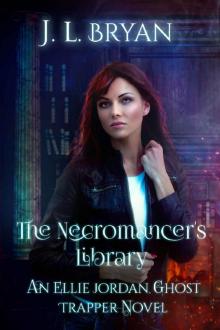 Ghost Trapper 12 The Necromancer's Library
Ghost Trapper 12 The Necromancer's Library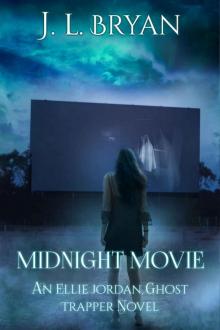 Ghost Trapper 14 Midnight Movie
Ghost Trapper 14 Midnight Movie_preview.jpg) Fairy Metal Thunder (Songs of Magic, Book 1)
Fairy Metal Thunder (Songs of Magic, Book 1)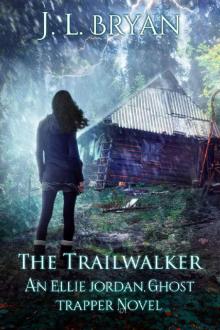 Ghost Trapper 13 The Trailwalker
Ghost Trapper 13 The Trailwalker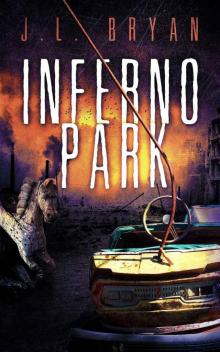 Inferno Park
Inferno Park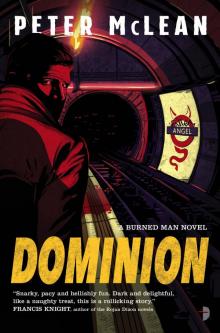 Dominion
Dominion Nomad
Nomad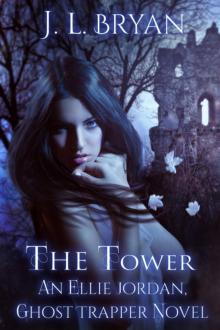 The Tower (Ellie Jordan, Ghost Trapper Book 9)
The Tower (Ellie Jordan, Ghost Trapper Book 9) Jenny Pox (The Paranormals, Book 1)
Jenny Pox (The Paranormals, Book 1)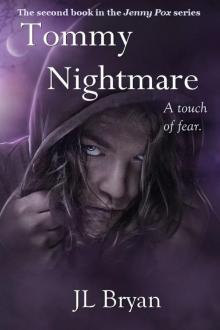 Tommy Nightmare (Jenny Pox #2)
Tommy Nightmare (Jenny Pox #2)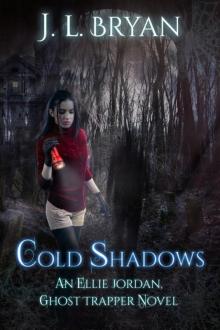 Cold Shadows (Ellie Jordan, Ghost Trapper Book 2)
Cold Shadows (Ellie Jordan, Ghost Trapper Book 2)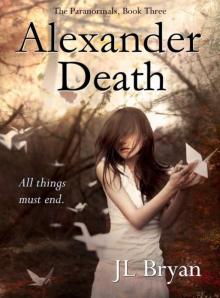 Alexander Death (The Paranormals, Book 3)
Alexander Death (The Paranormals, Book 3)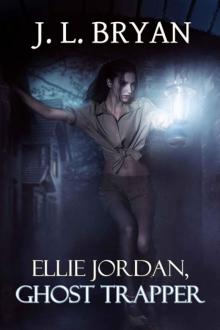 Ellie Jordan, Ghost Trapper
Ellie Jordan, Ghost Trapper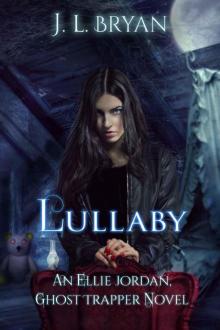 Lullaby (Ellie Jordan, Ghost Trapper Book 7)
Lullaby (Ellie Jordan, Ghost Trapper Book 7)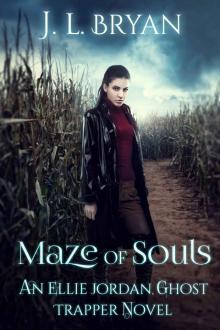 EJ06 - Maze of Souls
EJ06 - Maze of Souls Fairy Metal Thunder (Songs of Magic, #1)
Fairy Metal Thunder (Songs of Magic, #1)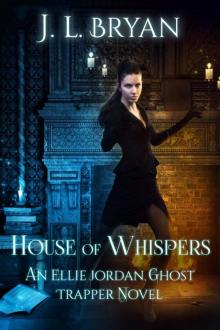 House of Whispers (Ellie Jordan, Ghost Trapper Book 5)
House of Whispers (Ellie Jordan, Ghost Trapper Book 5) Terminal (Ellie Jordan, Ghost Trapper Book 4)
Terminal (Ellie Jordan, Ghost Trapper Book 4) Jenny Pox
Jenny Pox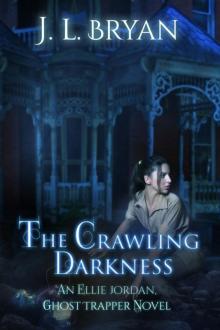 The Crawling Darkness (Ellie Jordan, Ghost Trapper Book 3)
The Crawling Darkness (Ellie Jordan, Ghost Trapper Book 3)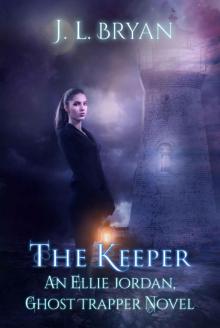 The Keeper (Ellie Jordan, Ghost Trapper Book 8)
The Keeper (Ellie Jordan, Ghost Trapper Book 8)